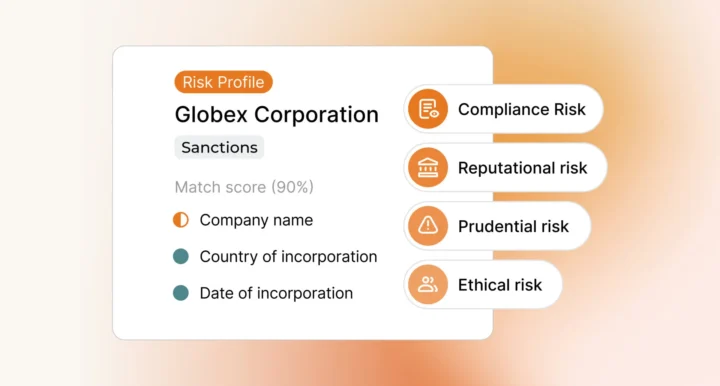As the largest and most influential economy in the world, the United States addresses financial criminal threats by enforcing strict anti-money laundering (AML) and counter-financing of terrorism (CFT) regulations. Research suggests that up to $300 billion is laundered in the US annually, with AML compliance costing US firms up to $25.3 billion per year.
Given the criminal threat, the US AML/CFT regulations involve a range of important reporting and record-keeping obligations which are based on standards set out by the Financial Action Task Force (FATF). Violations of AML regulations in the US are serious crimes and may result in financial penalties and even prison sentences for implicated individuals. If you do business in the US, it’s important that you develop a strong understanding of the relevant AML/CFT laws, become familiar with US financial regulators, and ensure that your business is able to meet its regulatory obligations on an ongoing basis.
Who are the USA Financial Regulators?
The Financial Crimes Enforcement Network
The USA’s principal financial regulator is the Financial Crimes Enforcement Network (FinCEN) which operates under the authority of the Department of the Treasury and serves as the USA’s Financial Intelligence Unit (FIU). FinCEN’s stated mission is to ‘safeguard the financial system from illicit use and combat money laundering and promote national security through the collection, analysis, and dissemination of financial intelligence and strategic use of financial authorities’.
FinCEN provides oversight for all banks and financial institutions in the US as part of the global fight against money laundering and the financing of terrorism. Its responsibilities involve the collection of transaction data from US firms and the distribution of that data for law enforcement purposes. Where necessary, FinCEN partners with law enforcement agencies at the state and federal levels, to aid criminal investigations. FinCEN also cooperates with its international counterparts in order to help fight global financial crime.
The Office of Financial Assets Control
The Office of Financial Assets Control (OFAC) oversees the US sanctions programmes, ensuring that US firms comply with the trade prohibitions on targets set out in the relevant sanctions lists. The US maintains a number of sanctions lists, but its principal list is the Specially Designated Nationals (SDN) and Blocked Persons List. The SDN list includes the names of persons designated for economic sanctions on one of the US global sanctions programmes.
What are the Key US AML Regulations?
The Bank Secrecy Act
The primary article of AML legislation in the US is the Bank Secrecy Act (BSA). Introduced in 1970, the BSA imposes reporting and record-keeping obligations on US banks and financial institutions in order to prevent criminals using their products and services to launder money. Under the BSA, institutions must implement internal AML controls including monitoring their customers and transactions for suspicious activity, and reporting suspicious activity to FinCEN.
The Patriot Act
In 2001, following the September 11 terror attacks, the US passed the USA Patriot Act as an amendment to the BSA. The Patriot Act introduced new powers for US law enforcement agencies when investigating suspected terrorism financing. In particular, the Patriot Act imposes a range of customer due diligence (CDD) and screening responsibilities on US companies, and focuses on international transactions and business relationships. The Patriot Act imposes criminal and financial penalties for persons found to be in violation of CFT compliance rules.
AMLA 2020
In 2021, the US introduced the Anti-Money Laundering Act (AMLA) 2020. The Act was held up as the most significant reform to US AML/CFT legislation since the implementation of the Patriot Act, and a means to manage the threats posed by new technologies and criminal methodologies. Amongst the regulatory measures introduced by AMLA were new beneficial ownership rules to prevent the misuse of shell companies, increased money laundering penalties, new whistleblower protections, and expanded international information sharing rules.
US AML Compliance
As an FATF member state, the US requires firms to take a risk-based approach to AML/CFT. This means that they must assess their customers at onboarding to establish the level of compliance risk they present, and then deploy AML/CFT measures in proportion to that risk. In practice this means that firms may subject higher risk customers to more intense monitoring and screening measures.
With that in mind, an effective US AML compliance programme should feature:
- Customer identification: Firms in the US must establish and verify the identities of their customers in order to conduct an effective risk assessment. The customer due diligence process should involve the collection of names, addresses, dates of birth, and beneficial ownership information.
- Transaction screening: US firms must screen their customers’ transactions for signs of suspicious activity, including unusual transaction patterns, transactions with high risk customers and jurisdictions, or transactions involving sanctions targets.
- Politically exposed persons: Government officials represent an elevated risk of money laundering. With that in mind, US firms should screen customers against politically exposed persons (PEP) lists to determine the level of compliance risk they present.
- Sanctions screening: US firms must screen their customers against the relevant sanctions lists, including the SDN list, and the UNSC sanctions list.
Enhanced due diligence
Under the risk-based approach to AML/CFT, the US requires firms to subject higher risk customers to enhanced due diligence (EDD) measures. The EDD process should include a greater degree of AML/CFT scrutiny, stronger identity verification measures, and checks into the source of customer funds and wealth. Enhanced due diligence measures might also include PEP screening and sanctions screening.
Adverse media checks
Criminal activity and other compliance related risks may be reported in news media before they are confirmed by official sources. Accordingly, the enhanced due diligence process may also include adverse media checks, which require firms to search a range of news sources for customer involvement in negative stories.
In the US, adverse media screening may involve searching non-English news sources, which means that firms must implement suitable screening technology to match customer names in foriegn languages. Adverse media screening technology is essential to the US AML compliance process: with that in mind, Ripjar’s next generation risk screening solution enables your firm to capture breaking news stories from across the world in real time, reduce false positive hits, and ensure that your compliance team is informed as soon as a customer’s risk profile changes.
Contact us to discuss how Ripjar can support your AML compliance in the USA
Last updated: 16 August 2024





